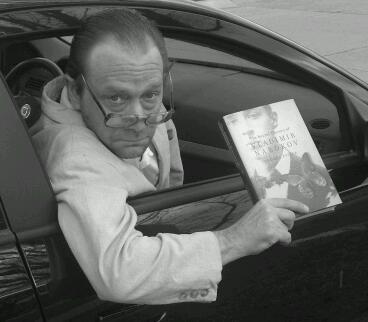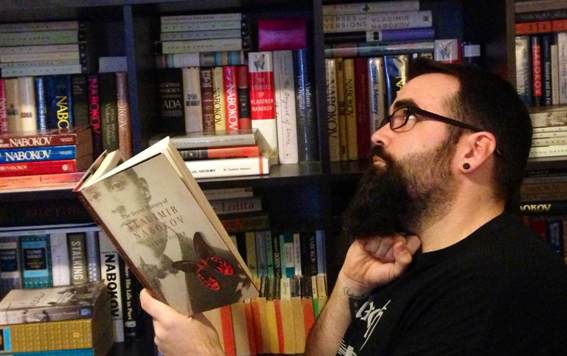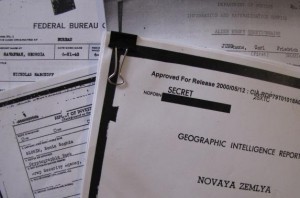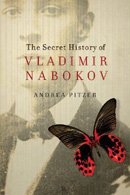posted by Andrea Pitzer on Mar 25 2013
Filed In: News
If you live in the greater Boston area, be sure to come to Harvard Book Store in Cambridge this Friday at 7:00 pm, when I’ll be reading from (and signing copies of) The Secret History of Vladimir Nabokov.
 I’m excited to return to Cambridge, where I was living when I first began my research—and where Nabokov spent several years of his life. During the 1940s Nabokov worked at Harvard’s Museum of Comparative Zoology. Charged with reorganizing the museum’s butterfly collection, he spent many hours at the museum first as a volunteer and then under contract on a part-time basis (while also lecturing at Wellesley College). He moved to upstate New York in 1948 to become a professor at Cornell, but returned to Cambridge for one semester in 1953 to teach literature at Harvard.
I’m excited to return to Cambridge, where I was living when I first began my research—and where Nabokov spent several years of his life. During the 1940s Nabokov worked at Harvard’s Museum of Comparative Zoology. Charged with reorganizing the museum’s butterfly collection, he spent many hours at the museum first as a volunteer and then under contract on a part-time basis (while also lecturing at Wellesley College). He moved to upstate New York in 1948 to become a professor at Cornell, but returned to Cambridge for one semester in 1953 to teach literature at Harvard.
Harvard Book Store is just blocks from the museum—and even closer to Nabokov’s lodgings on Cambridge Street, where he lived briefly during his return to campus. The Friday reading is free and open to the public. I hope to see you there!
posted by Andrea Pitzer on Mar 22 2013
Filed In: News
Thanks to all of you who sent in pictures of yourselves with your copy of The Secret History! I’ll announce the winner of the drawing (and explain our super-scientific method for choosing) in a moment. But before we get to that, I’d like to share two photos that knocked my socks off even though they didn’t win.
First up is Detroit’s Scott Screws lounging curbside, with what may be the most creative entry of the bunch. (Take a quick peek here if you don’t get the joke.)

And second up is the equally impressive submission by Michael from Seattle, whose Nabokov collection (this is only part of it) may well surpass my own—and is much more beautifully arranged.

Read more ›
posted by Andrea Pitzer on Mar 21 2013
Filed In: News
In June 1962 Mary McCarthy wrote what would become perhaps the most famous review ever written of Nabokov’s Pale Fire. In “Bolt from the Blue,” which ran in the pages of The New Republic, McCarthy called the novel a “a clockwork toy, a chess problem, an infernal machine,” and “one of the very great works of art of this century.”
Today in The New Republic, Alexander Nazaryan reviews The Secret History, along with the much-anticipated Nabokov play The Tragedy of Mister Morn. The title is “Nabokov’s Politics: New works alter his image as a disinterested aesthete.”
Here’s an excerpt from his comments on The Secret History:
… instead of treating Nabokov as a coddled aesthete removed from the concerns of the twentieth century, Pitzer depicts him as fully engaged with the concerns of the world—though he was far too courtly, too genteel, to shout his convictions from the rooftops. Given how much scholarship concerns Nabokov’s oeuvre, it is bold to contend, as Pitzer does in her introduction, that “a whole layer of meaning in his work has vanished.” That statement had me sharpening my critical daggers. But by the end, Pitzer managed to pretty much make her case, mostly by not belaboring the point, though also never deviating from it.
Read more ›
posted by Andrea Pitzer on Mar 18 2013
Filed In: News
Kate Tuttle of The Boston Globe weighed in over the weekend with a generous review of The Secret History that ran in the March 17 print edition of the paper.
Noting Nabokov’s reputation as a “an almost impossibly gorgeous stylist, a linguistic virtuoso whose works glided past the wars, revolutions, and genocides that scarred 20th-century Europe,” Tuttle outlines the book’s argument that a return trip to reread Nabokov’s masterpieces reveals an author deeply engaged in portraying the tragic history of his era.
Pitzer takes readers on that trip, integrating Nabokov’s biography with a close reading of his works, asserting that amid some of the century’s most playful, glittering prose lurked the author’s “own private map, revealing the most profound losses of his life and the forgotten traumas of his age.”
…
Pitzer, like Nabokov, is a beautiful writer and gimlet-eyed observer, especially about her subject; even as an impoverished refugee living in America, she writes, “Nabokov was never shy about his sense of self.” Her attention to history’s moral components is refreshingly blunt: “The dead are not nameless,” she writes of the writers and others killed in Stalin’s Great Purge of the late 1930s. Inviting us to reconsider Nabokov, Pitzer also introduces herself as a writer worthy of attention.
Read the full review here, and more about Kate Tuttle here.
posted by Andrea Pitzer on Mar 12 2013
Filed In: News
Calling all Nabokov fans, literary fiends, and history buffs in the nation’s capital! I’m giving a (free!) talk this Thursday, March 14, at 6:00 pm in downtown DC to celebrate the publication of The Secret History of Vladimir Nabokov.
 Appropriate to the setting, I’ll cover the ways in which FBI files, newspaper archives, and declassified CIA records reveal Nabokov’s deep political engagement in his most famous novels–masterpieces widely believed to be unmoored from history in any significant sense.
Appropriate to the setting, I’ll cover the ways in which FBI files, newspaper archives, and declassified CIA records reveal Nabokov’s deep political engagement in his most famous novels–masterpieces widely believed to be unmoored from history in any significant sense.
The talk will take place at 1307 L Street, NW, just three blocks from the McPherson Square Metro station, in the heart of NYU’s fabulous new DC campus. You can see more details of the talk at the event link (just click the violet button to sign up). You don’t have to pay, but you do have to register.
Stay and hobnob with interesting people at the reception afterward! And those so inclined will have a chance to buy a copy of the book and get it signed. It’s an informal launch party, and I’m excited about it because there will be lots of opportunity for discussion after the talk.
I hope you’ll join us on Thursday. (But don’t forget to register!)
Back to Top |
Comments Off on Nabokov in DC: how declassified intelligence and forgotten history reveal hidden stories in Lolita and Pale Fire
posted by Andrea Pitzer on Mar 08 2013
Filed In: News
Do you live or work in Manhattan? If so, join me at noon on Wednesday, March 13, at the 92nd Street Y’s Tribeca location to talk about Nabokov in America. I’ll cover the calamities that turned him into a refugee from both the Soviets and the Nazis, as well as what he found in the New World after his 1940 arrival in Manhattan.
 More importantly, I’ll explain how Nabokov folded the anti-Semitism he witnessed in Germany, France, and America into the pages of Lolita, where his biting indictment of global bigotry went unnoticed by the vast majority of readers. We’ll also shine a light on some lost history (the current events Nabokov tucked into the novel, the existence of a real Camp Q, and more). And I’ll introduce a few unusual characters among Nabokov’s family and associates who mirrored—and perhaps inspired—his fiction.
More importantly, I’ll explain how Nabokov folded the anti-Semitism he witnessed in Germany, France, and America into the pages of Lolita, where his biting indictment of global bigotry went unnoticed by the vast majority of readers. We’ll also shine a light on some lost history (the current events Nabokov tucked into the novel, the existence of a real Camp Q, and more). And I’ll introduce a few unusual characters among Nabokov’s family and associates who mirrored—and perhaps inspired—his fiction.
Nabokov himself did a poetry reading at the 92nd Street Y back in April 1964. Material from his appearance there was included in the Y’s 2009 tribute to Nabokov. Watch that tribute here, complete with cameos by Martin Amis, Chip Kidd, and Nabokov biographer Brian Boyd. Or even better, watch the tribute, then sign up to join us at the Y’s Tribeca location on the 13th. I hope to see you there—but you do have to register!
 I’m excited to return to Cambridge, where I was living when I first began my research—and where Nabokov spent several years of his life. During the 1940s Nabokov worked at Harvard’s Museum of Comparative Zoology. Charged with reorganizing the museum’s butterfly collection, he spent many hours at the museum first as a volunteer and then under contract on a part-time basis (while also lecturing at Wellesley College). He moved to upstate New York in 1948 to become a professor at Cornell, but returned to Cambridge for one semester in 1953 to teach literature at Harvard.
I’m excited to return to Cambridge, where I was living when I first began my research—and where Nabokov spent several years of his life. During the 1940s Nabokov worked at Harvard’s Museum of Comparative Zoology. Charged with reorganizing the museum’s butterfly collection, he spent many hours at the museum first as a volunteer and then under contract on a part-time basis (while also lecturing at Wellesley College). He moved to upstate New York in 1948 to become a professor at Cornell, but returned to Cambridge for one semester in 1953 to teach literature at Harvard.



